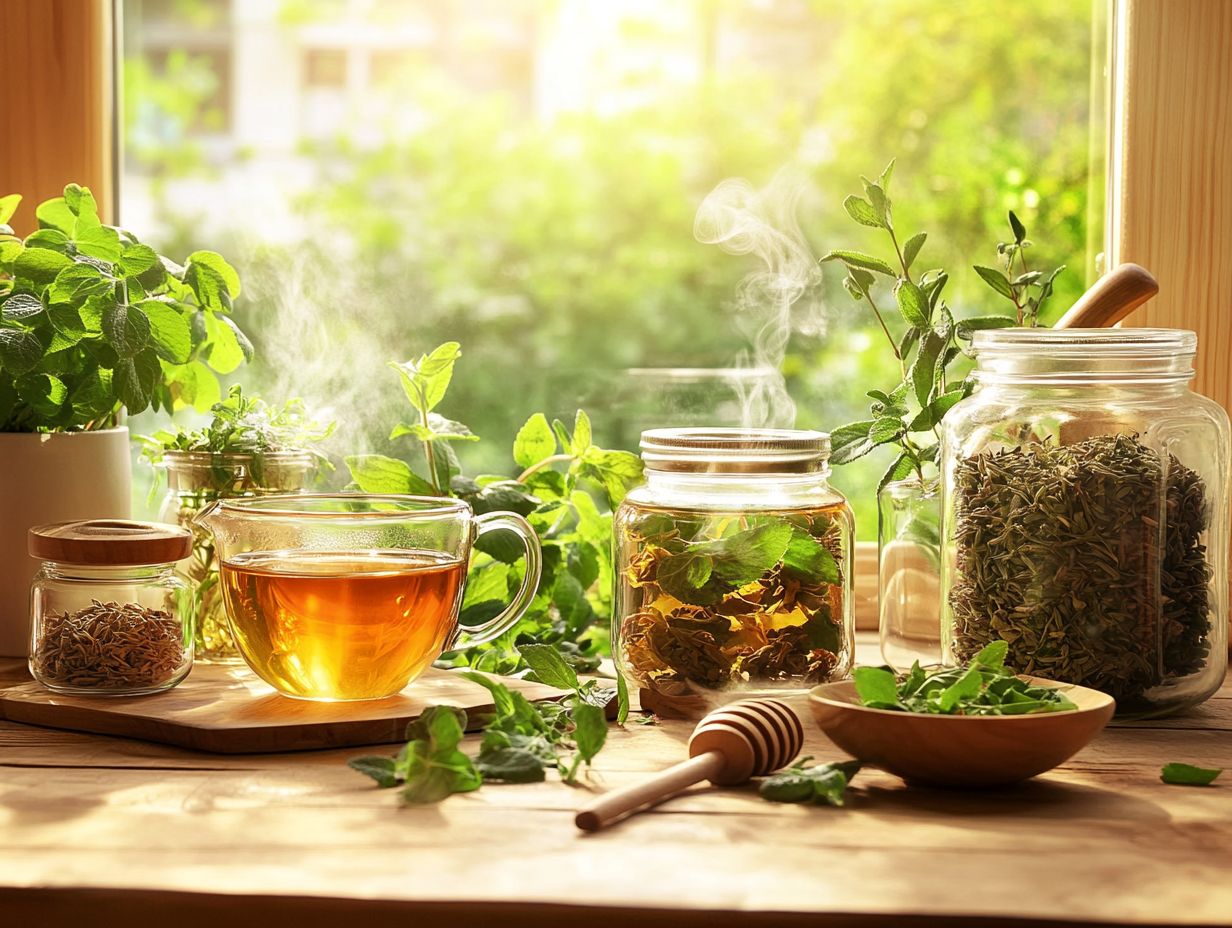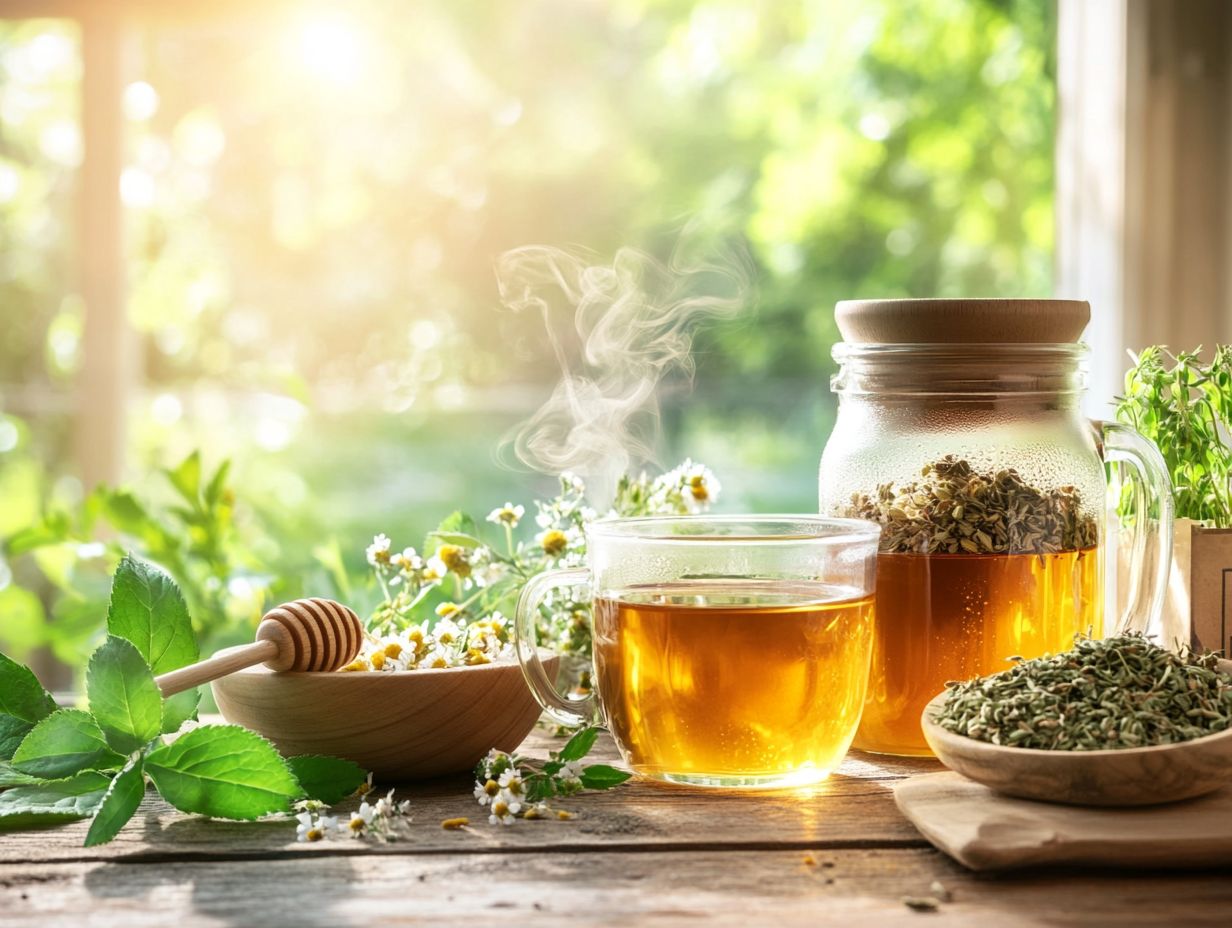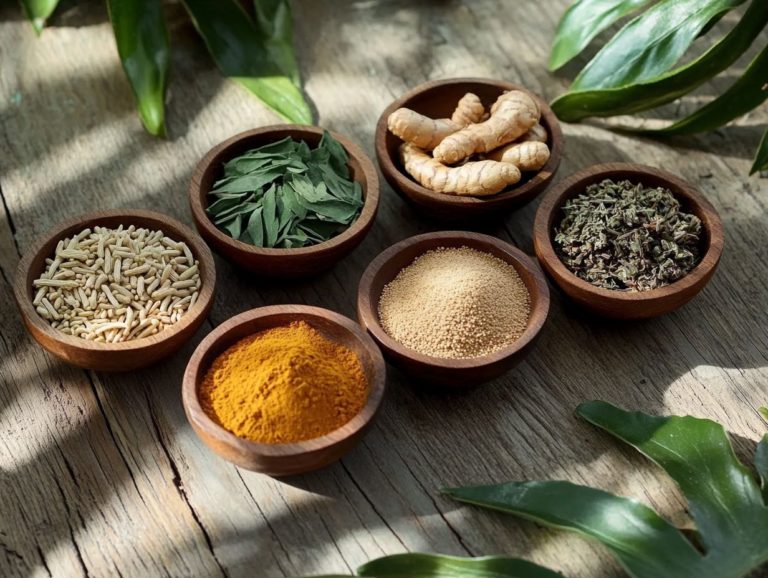The Best Herbal Remedies for Fatigue
Fatigue can be an all-consuming experience, deeply impacting your daily life and overall well-being. Understanding its causes and symptoms is your first step toward finding relief.
While conventional treatments like medications and therapies are widely used, many are now turning to herbal remedies for a more natural approach.
This article delves into the benefits and effectiveness of top herbal options:
- Ginseng
- Rhodiola
- Ashwagandha
- Maca
- Reishi mushroom
It also provides insights on using these remedies safely and highlights important precautions. Dive into these powerful herbal remedies now to boost your energy!
Contents
Key Takeaways:

Try herbal remedies like ginseng, rhodiola, and ashwagandha for fatigue. Follow recommended dosages for safety and effectiveness.
Consult with a healthcare professional before use to be aware of potential risks and interactions.
Understanding Fatigue
Fatigue is a complex issue that can profoundly affect your daily life, diminishing alertness, mental clarity, and overall well-being.
Various lifestyle factors contribute to fatigue, including inadequate sleep, chronic stress, and nutrient deficiencies. Understanding these causes is essential for effective management and recovery.
This condition manifests as both physical and mental exhaustion, impacting your mood and cognitive performance. Addressing it thoughtfully can lead to significant improvements in your quality of life.
Causes and Symptoms
The causes of fatigue can vary widely, ranging from hormonal imbalances and chronic fatigue syndrome to inadequate sleep and nutritional deficiencies. Your experience of fatigue can manifest in unique ways, often leaving you feeling drained and overwhelmed.
Hormonal imbalances, particularly those involving thyroid hormones or adrenal glands, can significantly impede energy levels, leading to sluggishness and a dip in motivation.
Chronic fatigue syndrome brings on profound exhaustion that doesn t improve with rest, often accompanied by memory issues and difficulty concentrating.
Inadequate sleep, marked by frequent awakenings or insufficient deep sleep, can sap your energy and negatively impact mental resilience, resulting in irritability and a lack of focus.
Nutritional deficiencies, whether from a poor diet or inadequate absorption, may further exacerbate these symptoms, making it difficult to maintain vitality and overall well-being.
Conventional Treatment for Fatigue
Conventional treatment for fatigue typically incorporates medications and therapeutic interventions aimed at targeting underlying causes while promoting overall well-being.
Medications and Therapies
Medications for fatigue generally include stimulants and antidepressants, designed to enhance cognitive performance and boost energy production. These treatments can address the relentless exhaustion many face.
Stimulants can significantly enhance energy levels and sharpen focus, making them advantageous for those with ADHD or sleep disorders. However, it’s essential to consider these benefits alongside potential side effects, such as insomnia or increased heart rate.
Antidepressants target mood disorders that often cause fatigue, although they may induce lethargy in some users.
Integrating therapeutic methods, such as talk therapy that helps change negative thoughts, along with lifestyle changes like exercise and a balanced diet, can create a comprehensive strategy for reclaiming energy and vitality.
Herbal Remedies for Fatigue
Herbal remedies for fatigue have become increasingly popular as natural solutions to enhance energy, bolster immune support, and promote overall wellness, providing compelling alternatives to conventional treatments.
Benefits and Effectiveness

The benefits of herbal remedies for fatigue are truly remarkable. They offer improved energy levels, enhanced cognitive performance, and effective stress reduction.
These natural solutions have become increasingly popular, not just for their potential to rejuvenate your body but also for their ability to promote your overall well-being. Research backs up the claims that herbs like Rhodiola Rosea and Ashwagandha can alleviate symptoms of both physical and mental exhaustion.
Many individuals report heightened stamina and clarity when they incorporate these remedies into their daily routines.
Numerous studies highlight how specific compounds in herbs can help regulate stress hormones. This regulation ultimately leads to a more balanced state and facilitates recovery from weariness.
Whether you enjoy them as teas, tinctures, or supplements, these herbal allies can be your new go-to for tackling fatigue.
Herbal Remedies to Boost Energy
Some of the finest herbal remedies for combating fatigue include ginseng, ashwagandha, rhodiola, and maca. Each of these herbs has unique properties that can significantly elevate your energy levels and enhance your overall vitality.
Ginseng
Ginseng is celebrated for its remarkable ability to elevate energy levels and enhance cognitive performance. This stress-relieving herb has a rich history in traditional medicine and is revered for its potential to boost immunity and foster overall well-being.
By integrating ginseng into your daily routine, you may experience increased stamina and sharper focus, making it easier to tackle even the most demanding tasks. Whether as a tea, powder, or capsule, this versatile root fits seamlessly into various lifestyles.
A morning cup of ginseng tea or a supplement taken with breakfast could be your simple yet effective strategy for harnessing its myriad benefits throughout the day.
Rhodiola
Rhodiola is an exceptional stress-relief herb that helps combat fatigue and enhances mental resilience. This remarkable herb has been embraced for centuries in traditional medicine, particularly in regions like Siberia and Scandinavia.
People have celebrated it for its ability to help the body adapt to stressors. Clinical studies have shown its effectiveness in reducing fatigue symptoms and improving cognitive function, making it a sought-after supplement for those looking to optimize performance.
Many users report increased alertness and clarity of thought, highlighting Rhodiola s role in sharpening mental acuity. Continuous research unveils more benefits, such as its potential to regulate mood and support a healthy immune response.
Ashwagandha
Ashwagandha is truly a gem, renowned for its numerous benefits, including effective stress management and hormonal balance. This stress-relieving herb has been a foundational element of Ayurvedic medicine for centuries.
Traditionally, it has been used to promote overall wellness and enhance vitality. Recent studies bolster these claims, indicating that ashwagandha reduces cortisol levels and uplifts mood.
Researchers are increasingly intrigued by how this ancient remedy aligns with modern wellness practices, unveiling its potential as a powerful supplement for those seeking to harmonize both physical and mental health.
Maca
Maca is a nutrient-rich root that boosts energy and uplifts your mood, making it a favored choice for anyone grappling with fatigue.
This root, originally cultivated in the high Andes of Peru, boasts impressive levels of vitamins B, C, and E, along with essential minerals such as calcium, magnesium, and zinc.
Its unique blend of amino acids plays a pivotal role in enhancing athletic performance and overall vitality.
To incorporate maca into your diet, consider adding it to:
- smoothies
- oatmeal
- baked goods
Just a teaspoon or two of maca powder can elevate your meals, providing a natural source of energy that gives you the power to tackle your day with renewed enthusiasm.
Start incorporating these herbs into your routine today for a vibrant and energetic tomorrow!
Reishi Mushroom

Reishi mushroom is highly regarded for its immune support and its remarkable ability to combat fatigue, thanks to its potent antioxidant properties. This extraordinary fungus has been treasured for centuries in traditional medicine, particularly within Asian cultures. It has earned the nickname “the mushroom of immortality.”
Beyond its rich history, recent scientific studies are starting to validate its effectiveness in enhancing overall vitality. By reducing oxidative stress, reishi mushroom not only strengthens immune function but also promotes mental clarity and stamina.
Integrating this powerhouse supplement into your daily routine could offer a vital boost. This is especially helpful when navigating the challenges of modern life, helping you restore balance and vitality.
How to Use Herbal Remedies for Fatigue
Utilizing herbal remedies for fatigue demands a thoughtful approach to dosage and preparation methods. This careful consideration is essential to fully harness their potential in boosting your energy levels. Act now to boost your energy levels!
Dosage and Preparation Methods
Proper dosage and preparation are essential for maximizing the effectiveness of herbal supplements in your battle against fatigue. Finding the right balance in the quantity you consume allows you to harness the nutrient density these remedies offer, ultimately leading to elevated energy levels.
- For instance, when considering ginseng, a common guideline suggests a daily dosage of 200 to 400 milligrams of the extract.
- Fatigue fighters like ashwagandha typically thrive at 300 to 500 milligrams, especially when prepared as a tea or tincture. This preparation aids the body in absorbing their rich compounds more effectively.
- Similarly, turmeric, celebrated for its anti-inflammatory properties, can be taken in doses ranging from 500 to 2,000 milligrams of curcumin, significantly enhancing your energy resilience.
The method of preparation you choose whether steaming, infusing, or decocting plays a crucial role in unlocking the inherent potency of each herbal remedy.
Precautions and Side Effects
While herbal remedies can provide substantial benefits for combating fatigue, be aware of the precautions and potential side effects that may accompany their use.
Potential Risks and Interactions
When you combine herbal medicine with other treatments, potential risks and interactions can emerge, particularly with substances like caffeine or specific medications. These interactions might lead to unintended side effects that could undermine the effectiveness of your prescribed drugs.
For example, widely used supplements such as St. John’s Wort are known to diminish the efficacy of antidepressants. Additionally, ginseng can interfere with blood thinners, increasing the risk of bleeding.
Some supplements can enhance stimulant effects like certain herbal blends and may elevate your heart rate when mixed with caffeine or other stimulants. This creates complications, especially if you have underlying heart conditions.
Thus, grasping the delicate balance between herbal therapies and conventional treatments is crucial for ensuring safe and effective healthcare.
Frequently Asked Questions
What are the best herbal remedies for fatigue?

The best herbal remedies for fatigue include ginseng, ashwagandha, maca root, rhodiola, licorice root, and holy basil.
How does ginseng help with fatigue?
Ginseng is known for its properties that help the body manage stress and fatigue. It also improves mental clarity and energy levels.
Is ashwagandha effective for treating fatigue?
Ashwagandha is an herb used in Ayurvedic medicine for centuries. It is known for its ability to reduce stress and anxiety while improving energy levels and mental clarity.
What is maca root and how does it help with fatigue?
Maca root is a Peruvian herb used for its energizing and restorative properties. It helps increase energy levels, reduce fatigue, and improve mood and mental focus.
Can rhodiola help with chronic fatigue syndrome?
Rhodiola is an herb traditionally used to combat fatigue and increase stamina. It has also been found effective in reducing symptoms of chronic fatigue syndrome.
Are there any safety concerns with using herbal remedies for fatigue?
Herbal remedies are often safe. However, it s essential to talk to your doctor before starting any new supplements or herbs, especially if you are pregnant, nursing, or taking medications.






